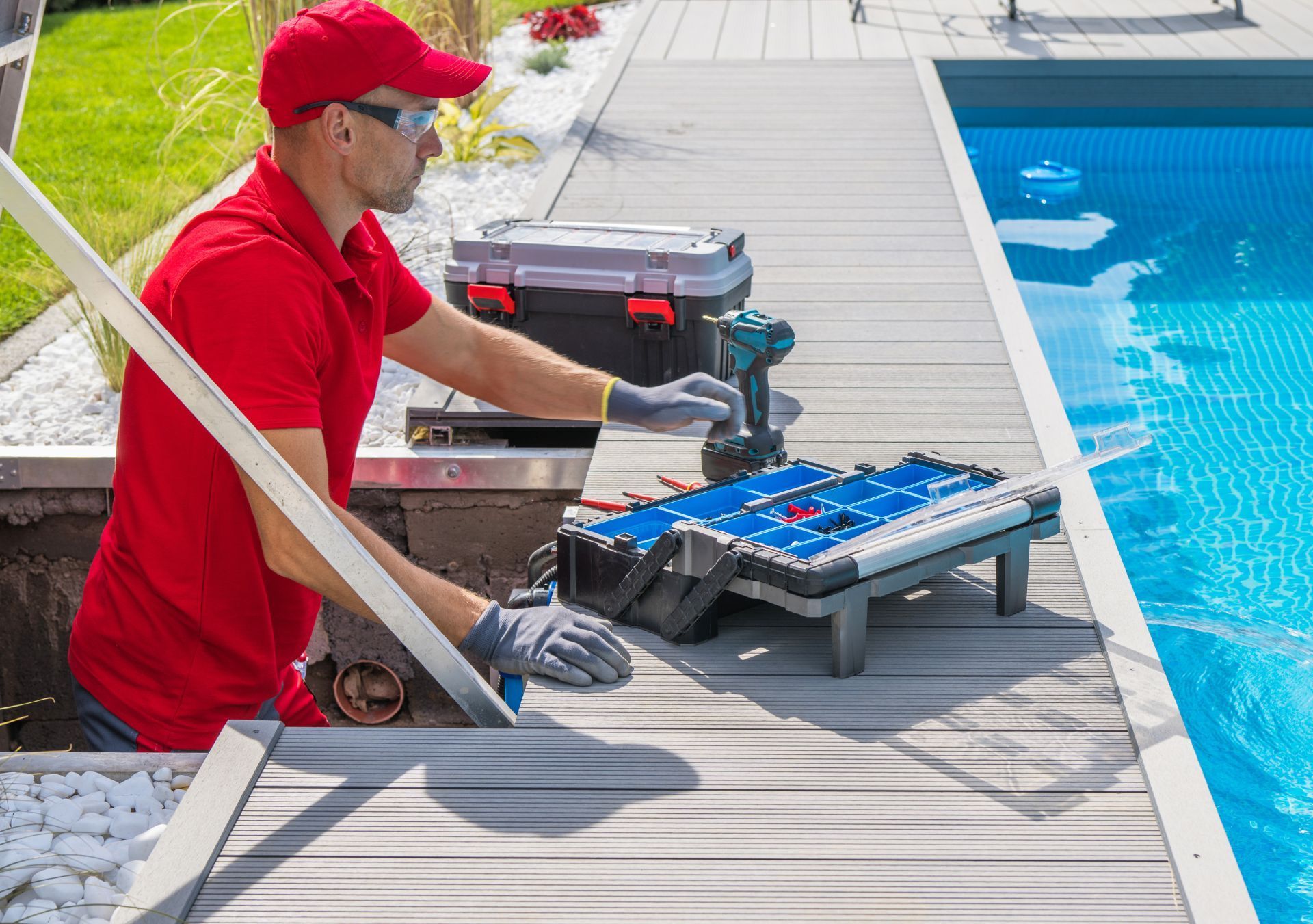Arizona Swimming Pool Contractor Insurance
See How We're Different:
or Call Us:(480) 526-3222

Most Common Business Policies
Index
Contact Us
Swimming pools are a popular addition to homes in Arizona, providing a refreshing escape from the heat. However, the installation and maintenance of these pools come with various risks. For swimming pool contractors, having the right insurance is essential to protect their business from potential liabilities. This article delves into everything you need to know about Arizona swimming pool contractor insurance.
Understanding Contractor Insurance
Contractor insurance is a broad term that encompasses various types of coverage designed to protect businesses and their employees from financial losses. For swimming pool contractors, this insurance is crucial due to the unique risks associated with pool installation and maintenance.
Types of Insurance for Pool Contractors
Several types of insurance are particularly relevant for swimming pool contractors. Each type serves a specific purpose and provides protection against different risks.
- General Liability Insurance: This is the most common type of insurance for contractors. It protects against claims of bodily injury or property damage that may occur during the course of work.
- Workers' Compensation Insurance: This insurance is mandatory in Arizona for businesses with employees. It covers medical expenses and lost wages for employees injured on the job.
- Commercial Auto Insurance: If contractors use vehicles for business purposes, this insurance is essential. It covers accidents and damages involving company vehicles.
- Professional Liability Insurance: Also known as errors and omissions insurance, this coverage protects against claims arising from professional mistakes or negligence.
Why Insurance is Essential for Pool Contractors
Operating without insurance can expose swimming pool contractors to significant financial risks. Lawsuits, accidents, and property damage can lead to substantial costs that could threaten the viability of the business.
Moreover, clients often require proof of insurance before hiring a contractor. Having the appropriate coverage not only protects the contractor but also instills confidence in potential clients, making it easier to secure contracts.
In addition to the financial protection that insurance provides, it also plays a vital role in risk management. By understanding the specific risks associated with swimming pool construction and maintenance, contractors can tailor their insurance policies to address potential hazards effectively. For instance, the installation of a pool involves heavy machinery, which can lead to accidents if not handled properly. Insurance not only covers the aftermath of such incidents but also encourages contractors to implement safety protocols that minimize risks in the first place.
Furthermore, the nature of the swimming pool industry often involves working in diverse environments, from residential backyards to commercial properties. Each location presents its own set of challenges and liabilities. Insurance helps contractors navigate these complexities by providing coverage that is adaptable to different job sites and client needs. This flexibility ensures that contractors can take on a wider range of projects without the fear of unexpected liabilities undermining their business operations.

Legal Requirements in Arizona
Arizona has specific legal requirements regarding contractor insurance. Understanding these regulations is vital for compliance and to avoid penalties.
Licensing Requirements
In Arizona, pool contractors must be licensed through the Arizona Registrar of Contractors (ROC). To obtain a license, contractors must provide proof of insurance, including general liability and workers' compensation coverage.
Failure to maintain the required insurance can result in the loss of the contractor's license, making it imperative to stay compliant with these regulations. Additionally, the ROC mandates that contractors complete a certain number of continuing education hours to ensure they are updated on the latest industry standards and practices. This ongoing education not only helps contractors stay compliant but also enhances their skills and knowledge, ultimately benefiting their clients.
Workers' Compensation Insurance
As mentioned earlier, workers' compensation insurance is mandatory for businesses with employees in Arizona. This insurance covers medical costs and lost wages for workers injured on the job, ensuring they receive necessary care without financial strain.
Contractors should regularly review their workers' compensation policies to ensure they meet state requirements and adequately cover their workforce. It is also advisable for contractors to foster a safe working environment to minimize the risk of workplace injuries. Implementing safety training programs and conducting regular safety audits can significantly reduce accidents and enhance employee morale, creating a more productive work atmosphere. Furthermore, being proactive about safety can lead to lower insurance premiums, benefiting the contractor's bottom line while ensuring the well-being of their employees
Choosing the Right Insurance Provider
Selecting the right insurance provider is a crucial step for swimming pool contractors. The right provider can make a significant difference in coverage options, customer service, and overall satisfaction.
Factors to Consider
When choosing an insurance provider, several factors should be taken into account:
- Experience: Look for providers with experience in the construction and contracting industry. They will better understand the unique risks associated with swimming pool installation.
- Coverage Options: Ensure the provider offers comprehensive coverage options tailored to the needs of pool contractors.
- Customer Service: A responsive and helpful customer service team can make the claims process smoother and more efficient.
- Financial Stability: Research the provider's financial ratings to ensure they can meet their obligations when claims arise.
Getting Quotes
Once potential providers have been identified, obtaining quotes is the next step. Contractors should request detailed quotes from multiple providers to compare coverage options and pricing.
It’s essential to review what is included in each quote, as the cheapest option may not always provide the best coverage. Understanding the nuances of each policy can help contractors make informed decisions.
Additionally, it can be beneficial to ask for references or testimonials from other contractors who have worked with the insurance providers. Hearing about their experiences can provide valuable insights into the provider's reliability and responsiveness during claims. Networking within the industry can also lead to recommendations for providers that have a proven track record in serving pool contractors effectively.
Moreover, consider the ease of managing your policy. Some insurance providers offer online portals where contractors can easily access their policy details, file claims, and make payments. This digital convenience can save time and reduce stress, allowing contractors to focus more on their projects rather than administrative tasks. As the industry evolves, having a provider that embraces technology can significantly enhance the overall experience of managing insurance needs.
Cost of Insurance for Pool Contractors
The cost of insurance for swimming pool contractors can vary widely based on several factors. Understanding these factors can help contractors budget effectively for their insurance needs.
Factors Influencing Insurance Costs
Several elements can impact the cost of insurance premiums for pool contractors:
- Business Size: Larger businesses with more employees may face higher premiums due to increased risk exposure.
- Claims History: Contractors with a history of claims may see higher premiums as they are considered higher risk.
- Coverage Limits: The amount of coverage selected will directly influence the cost. Higher limits typically result in higher premiums.
- Location: Insurance costs can vary by region based on local laws, risks, and market conditions.
Average Premiums
While costs can vary, swimming pool contractors in Arizona can expect to pay a range of premiums for their insurance. On average, general liability insurance can range from $400 to $1,200 annually, while workers' compensation insurance may cost between $2,500 and $4,500 per year, depending on the number of employees and payroll size.
In addition to the basic coverage options, pool contractors may also consider specialized insurance policies that cater to their unique needs. For instance, equipment insurance can protect against damage or theft of expensive tools and machinery used in pool construction and maintenance. This type of coverage is particularly important given the high value of equipment such as excavators, pumps, and filtration systems, which can easily run into thousands of dollars. Furthermore, contractors may want to explore pollution liability insurance, which can cover claims related to water contamination or chemical spills that may occur during the pool installation process.
Moreover, the insurance landscape is continually evolving, with new risks emerging as technology advances and regulations change. For example, the increasing use of smart pool technology and automated systems may introduce new liability concerns that contractors must address. Staying informed about these trends and adjusting insurance coverage accordingly is essential for pool contractors to ensure they are adequately protected against potential liabilities and unexpected costs. Engaging with an insurance broker who specializes in construction or contractor insurance can provide valuable insights and help tailor a policy that meets the specific needs of a pool contracting business.

Common Insurance Claims for Pool Contractors
Understanding the types of claims that commonly arise in the swimming pool contracting business can help contractors prepare and mitigate risks. The swimming pool industry, while rewarding, comes with its own set of unique challenges and potential liabilities. By being aware of these claims, contractors can better safeguard their business and provide a safer environment for both their employees and clients.
Types of Claims
Some of the most common insurance claims faced by pool contractors include:
- Bodily Injury Claims: Accidents involving clients or third parties can lead to bodily injury claims, especially if someone is injured on the job site. This can include slips and falls, which are particularly prevalent in wet environments, or injuries resulting from equipment mishandling.
- Property Damage Claims: Damage to a client's property during installation or maintenance can result in costly claims. For instance, if heavy machinery accidentally damages landscaping or existing structures, the contractor may be held liable for repair costs.
- Equipment Theft or Damage: Contractors often invest in expensive tools and equipment, making them targets for theft or vandalism. This can be especially problematic if specialized equipment is stolen, leading to project delays and increased costs.
Preventing Claims
While claims are sometimes unavoidable, contractors can take proactive steps to minimize their risk:
- Training and Safety Protocols: Implementing comprehensive safety training for employees can reduce the likelihood of accidents. Regular safety drills and refreshers can ensure that all team members are aware of best practices and emergency procedures, fostering a culture of safety on the job site.
- Regular Maintenance: Keeping equipment in good working order can prevent malfunctions that lead to accidents or damage. Scheduling routine inspections and servicing can help identify potential issues before they escalate into serious problems, ensuring that tools and machinery are always ready for safe operation.
- Clear Communication: Establishing clear communication with clients about project timelines and expectations can help avoid misunderstandings that lead to disputes. Providing clients with detailed contracts and regular updates can build trust and transparency, making it easier to address any concerns that may arise during the project.
In addition to these preventive measures, contractors should also consider investing in comprehensive insurance coverage tailored to their specific needs. This can include general liability insurance, equipment coverage, and even specialized policies that address the unique risks associated with pool construction and maintenance. By understanding the nuances of their insurance options, contractors can better protect their business and ensure they are prepared for any eventuality.
Furthermore, staying informed about industry trends and regulations is crucial. As safety standards evolve and new technologies emerge, pool contractors must adapt to these changes to maintain compliance and protect their clients. Engaging in ongoing education and networking with other professionals in the field can provide valuable insights and resources, helping contractors stay ahead of potential risks and enhance their operational practices.
Filing an Insurance Claim
In the event of an incident, knowing how to file an insurance claim is essential for swimming pool contractors. The process can vary by provider, but there are common steps to follow.
Steps to File a Claim
When a claim needs to be filed, contractors should:
- Notify the Insurance Provider: Contact the insurance company as soon as possible to report the incident.
- Document the Incident: Gather evidence, including photographs, witness statements, and any other relevant information.
- Complete Claim Forms: Fill out any required claim forms provided by the insurance company.
- Follow Up: Stay in contact with the insurance adjuster to ensure the claim is processed in a timely manner.
Understanding the Claims Process
The claims process can take time, and contractors should be prepared for potential delays. Insurance adjusters will assess the situation and determine the validity of the claim based on the provided documentation and policy coverage.
It’s crucial for contractors to remain patient and responsive during this process, as effective communication can help expedite the resolution of the claim. Additionally, contractors should familiarize themselves with their specific policy details, as coverage limits and exclusions can significantly impact the outcome of a claim. Understanding these nuances can empower contractors to present their case more effectively and anticipate any potential challenges that may arise during the review process.
Moreover, maintaining organized records throughout the project can be beneficial not only for claims but also for overall business management. Keeping a detailed log of communications, expenses, and project milestones can provide valuable context if disputes arise. This proactive approach not only aids in the claims process but also enhances the contractor's credibility and professionalism in the eyes of both clients and insurers.
Conclusion
In Arizona, swimming pool contractors face unique challenges and risks that make insurance an essential part of their business operations. Understanding the various types of insurance available, the legal requirements, and how to choose the right provider can significantly impact a contractor's success and peace of mind.
By investing in comprehensive insurance coverage, contractors can protect themselves from financial losses, enhance their credibility with clients, and focus on what they do best—creating beautiful and functional swimming pools. Whether just starting or looking to update existing coverage, taking the time to understand contractor insurance is a wise investment in the future of any swimming pool business.
